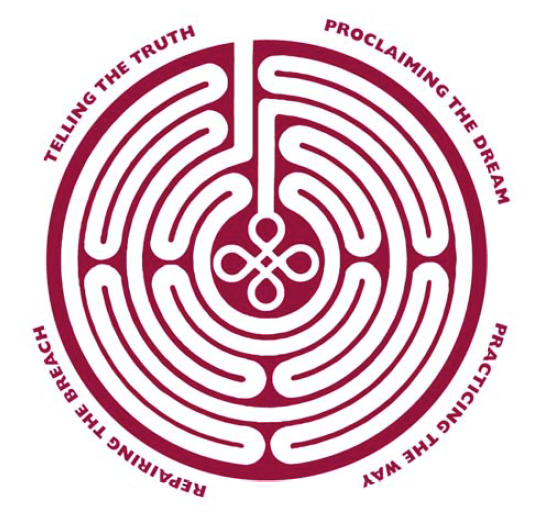A Message from the Rev. Canon Stephanie Spellers
If you’ve come this far, chances are your heart has been broken. You’ve wished for ways to heal the wounds of racism, wounds we all bear: Latino and Asian, black and Indigenous, mixed race and white. You’ve wondered what it will take for America to engage in changing hearts as well as laws. You’ve followed the news and social media, perhaps marched and prayed, and wondered again and again, “What can I do with a problem so huge?”

You are not alone. The Episcopal Church is in the midst of an unprecedented, sustained focus on racial justice and reconciliation. In May 2017, Presiding Bishop Michael Curry and House of Deputies President Gay Jennings invited the whole Church into Becoming Beloved Community, a long-term commitment to racial healing, reconciliation, and justice. Together, we have begun walking the labyrinth with Jesus, stepping forward and turning back and getting centered on a deeply spiritual path that covers four quadrants:
- Telling the Truth about Our Churches and Race
- Proclaiming the Dream of Beloved Community
- Practicing the Way of Love in the Pattern of Jesus
- Repairing the Breach in Society and Institutions
Episcopalians everywhere have taken up the commitment in a wonderful variety of ways. It is clear that many of us long to live as beloved community and to reckon with the pain that racism has inflicted – and continues to inflict – in our personal lives, our churches and institutions, and society as a whole.
Sacred Ground represents a concrete way for us to enter and walk the Becoming Beloved Community labyrinth, especially as we Practice in the Pattern of Jesus. This 11-session curriculum uses films and readings to introduce stories, images, and language for grasping racial identity and experience across the spectrum. More than a teaching tool, Sacred Ground aims to call us from our small worlds and small screens and into intentional, sustained circles in which we can pray, watch, share our own stories, reflect, wonder, reckon, heal, and commit to action. Think of it as a pilgrimage in place.
In particular, Sacred Ground has been designed to provide a context for white folks to talk to other white folks about their own racial identity and stories, with an eye toward class, region, and family history. Why is this important? Whites-only or segregated groups sound like a step backward. But when it comes to the work of justice and healing, we need to do a dance – moving from interracial circles to affinity groups and back again. As a black person, I often need to test and speak vulnerable truths among other black people before extending outward. There is healing work we can only do with people who’ve engaged in the same struggle and bear the same responsibility.
This is also true for white folks – maybe more so. Think about it. After some public instance of racial injustice, there are a slew of social media posts begging white people to do their work with each other, to talk with family members and acquaintances and workmates, to hold one another accountable, and to have honest conversations that would be too tense to bear if a person of color were to initiate. I hear white folks who long to take steps in this direction, but they don’t know how to open that space, understand the history, talk about being white, or be patient and present and honest. And so it gets quiet … until the next atrocity.
With Sacred Ground, white folks may learn to create a faithful, compassionate, truthful space for hearing and sharing stories and histories. In this space – surrounded by our shared faith in redemption, resurrection of life, and the abounding grace of God – I hope white Episcopalians and friends will grow in wisdom, strength, courage, and wholeness. That’s the only way we become a beloved community.
All that said, you do not have to be white to participate in Sacred Ground. Whatever your racial background, we hope this carefully curated collection of readings and films will prove enlightening and transformative. If your church already has done significant work on racism, especially if white folks have done some internal work and don’t need people of color to serve as their “chaplains,” then an interracial circle could be a blessed step forward. The point is, there is no shame in admitting where we are and asking God to be our companion as we walk toward the new and vulnerable. As Dr. Catherine Meeks, an Episcopal leader and sage in this work, likes to say: No one needs to accomplish total healing instantly; just be “a shade braver” than you were the day before. Every time you do, you should pause, breathe, and look around. You will notice you are, indeed, standing on sacred ground.
May God make us brave. May God root us in our own and others’ absolute belovedness. May God grant us a vision for beloved community and lead us with care and boldness on the sacred path toward that dream. Amen.
the Rev. Canon Stephanie Spellers
Canon to the Presiding Bishop for Evangelism, Reconciliation, and Creation Care
